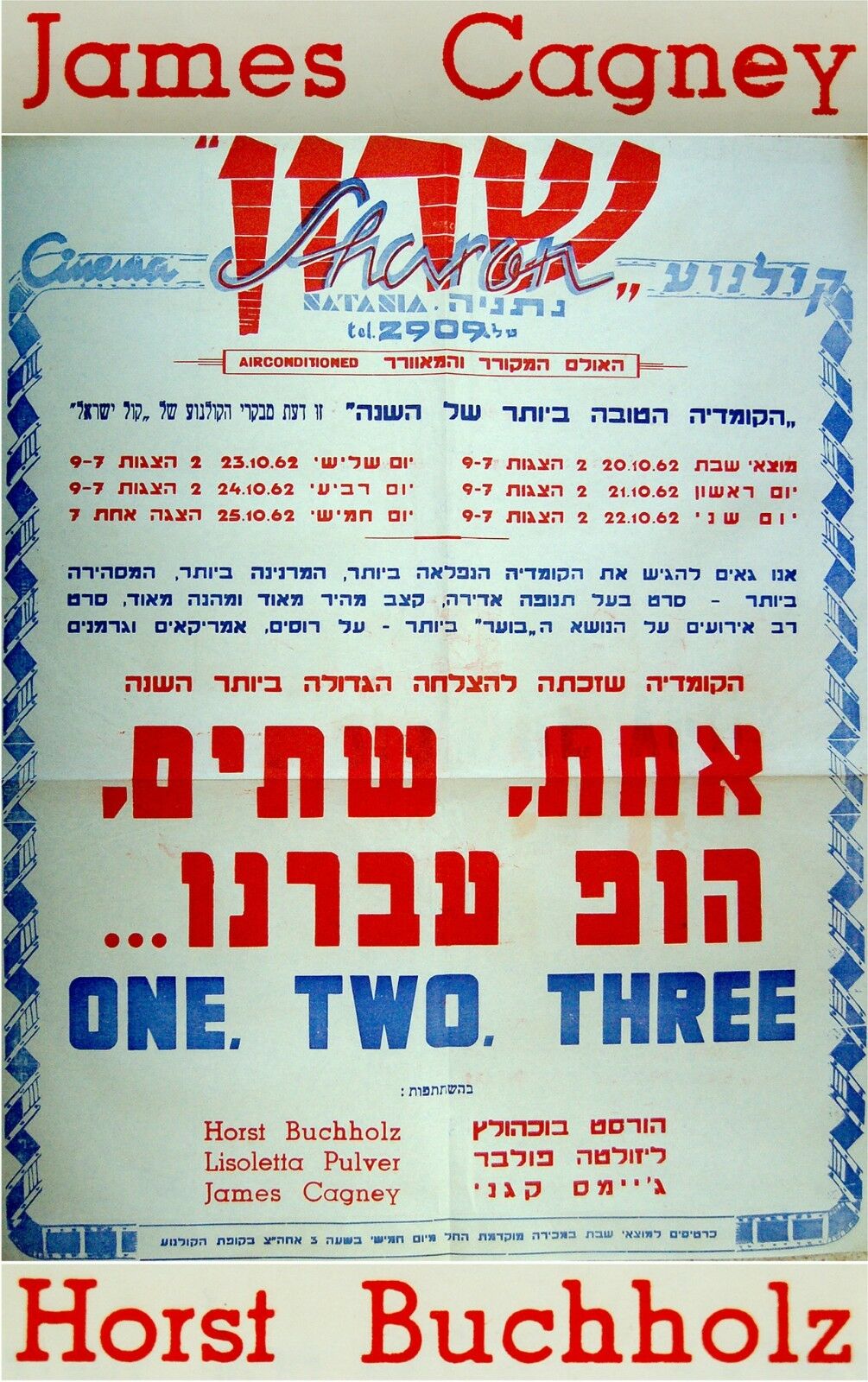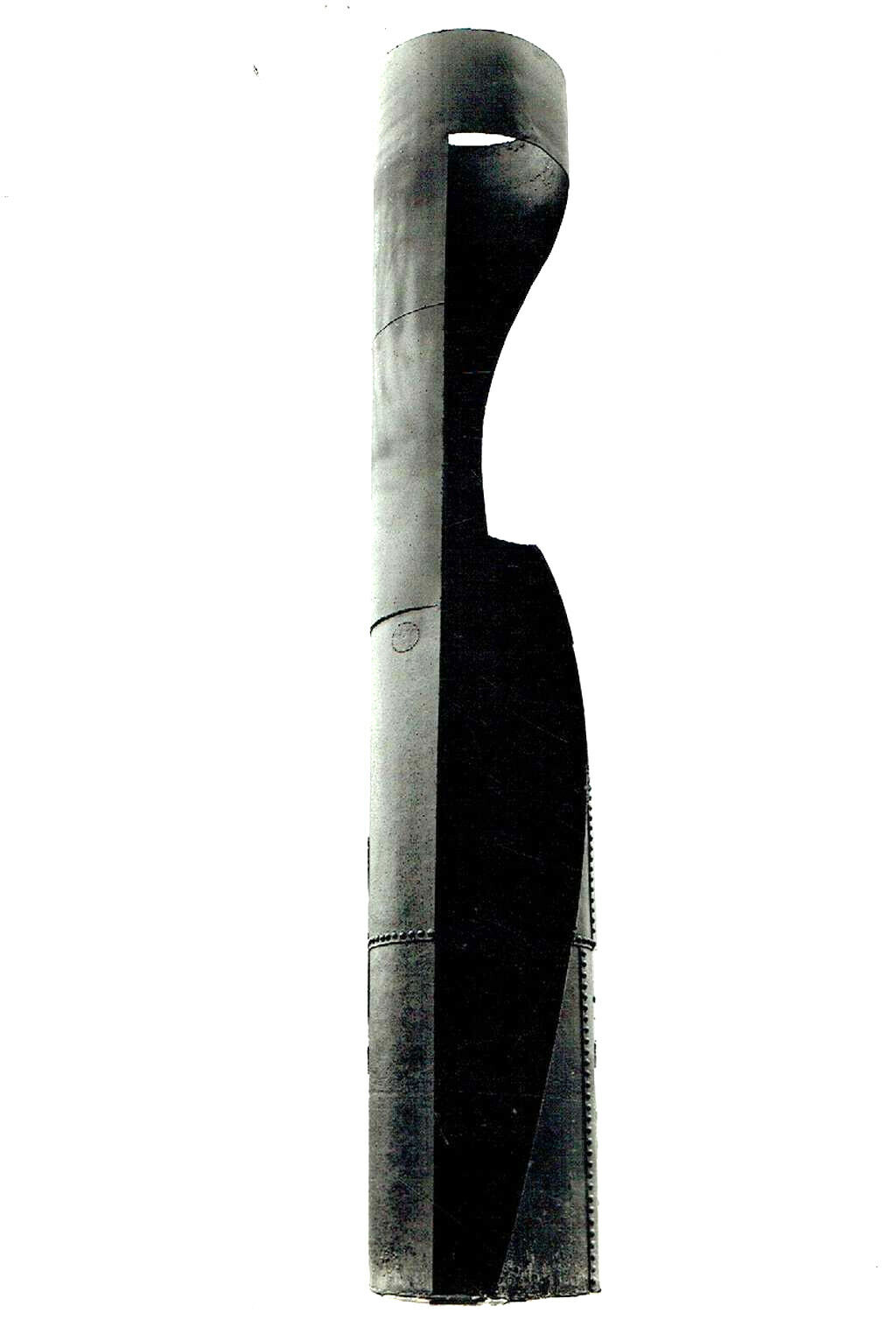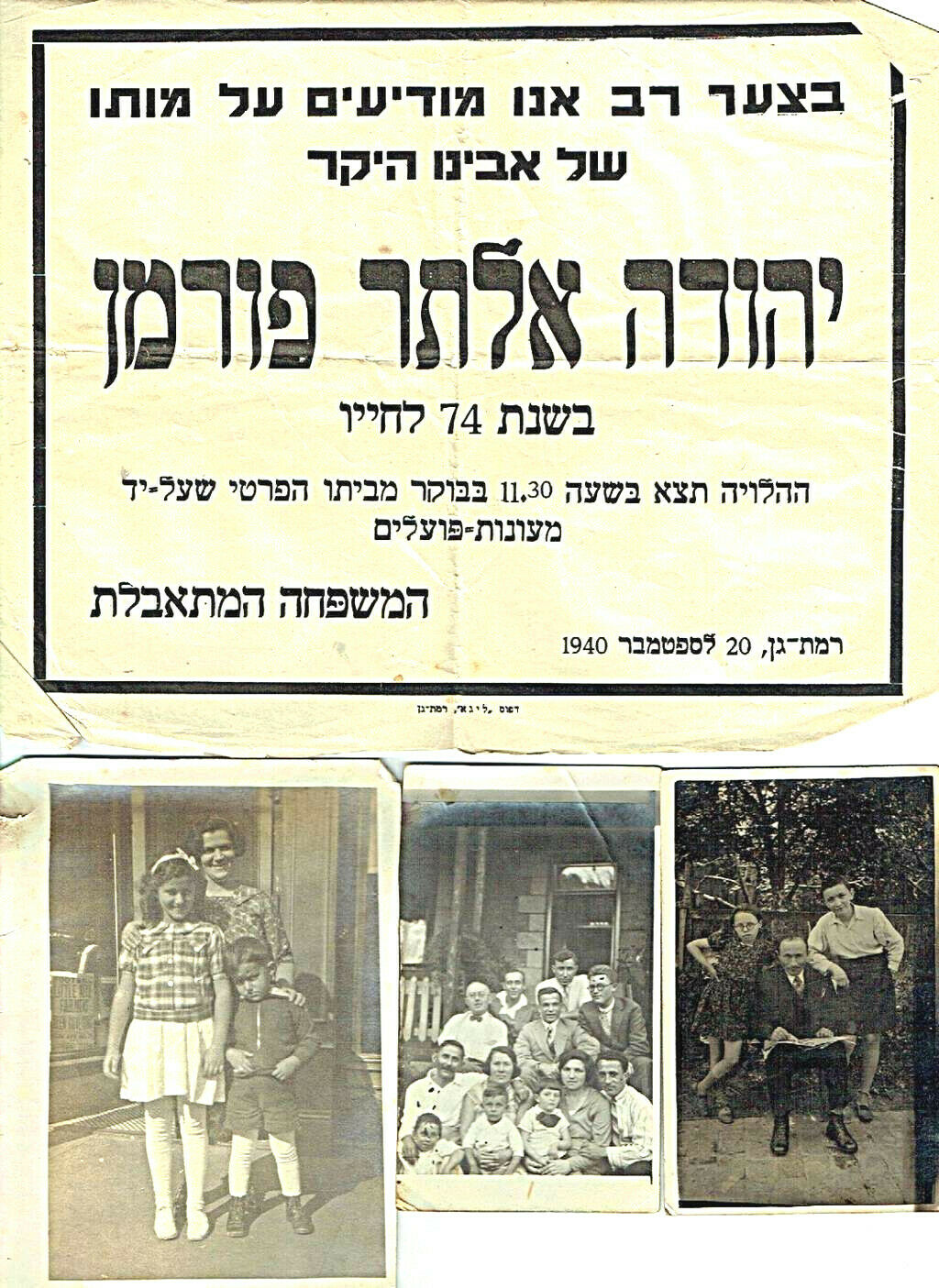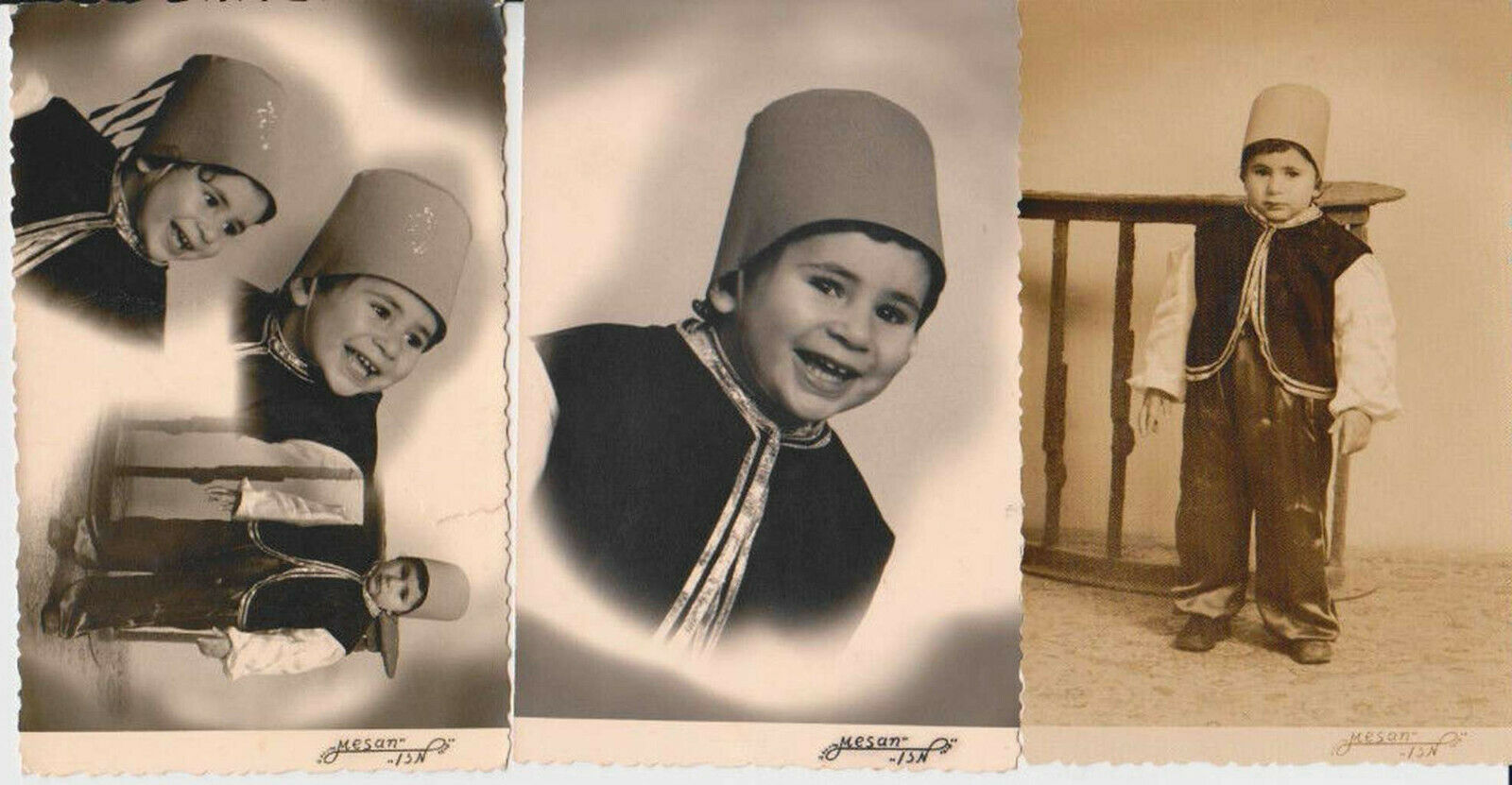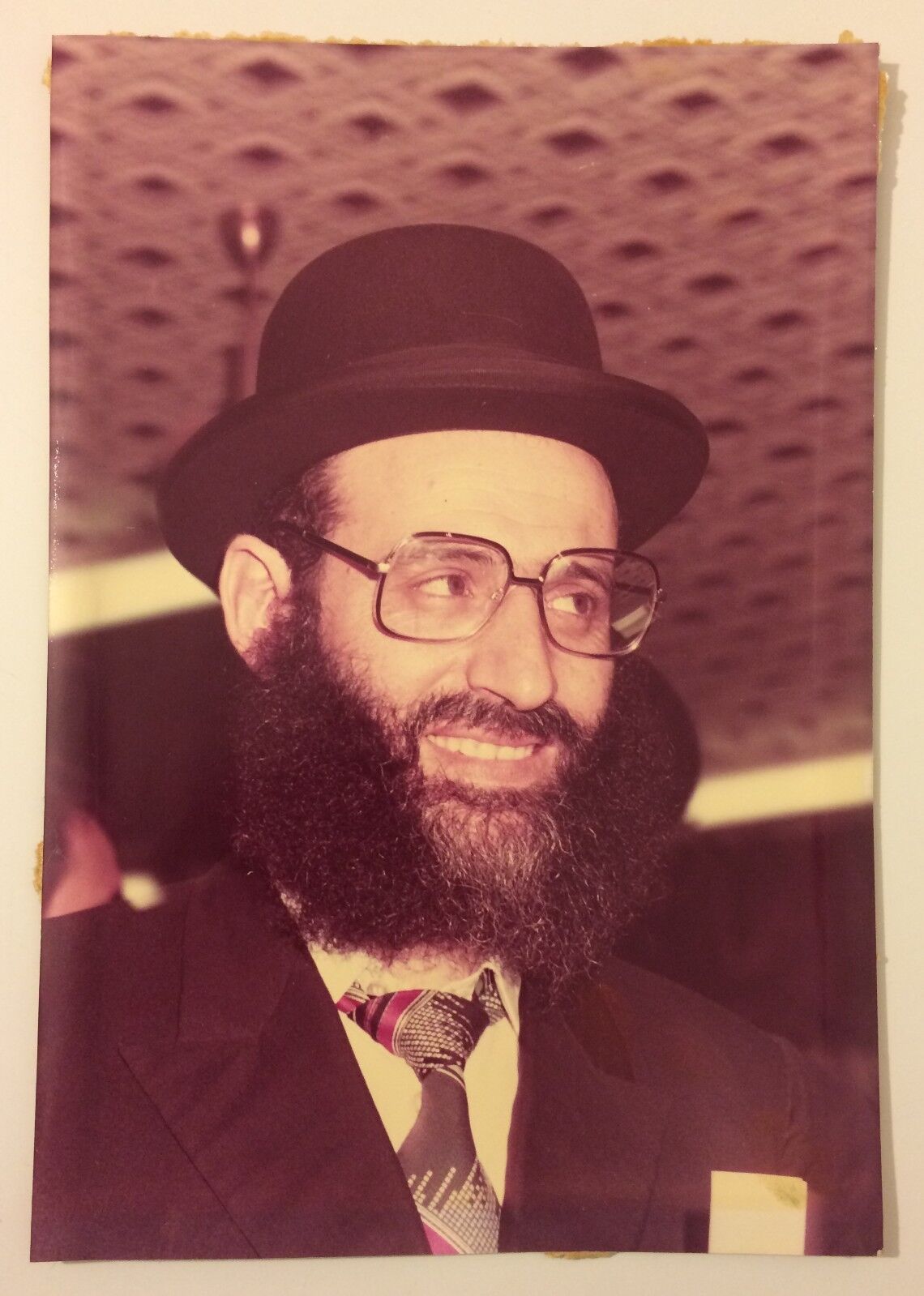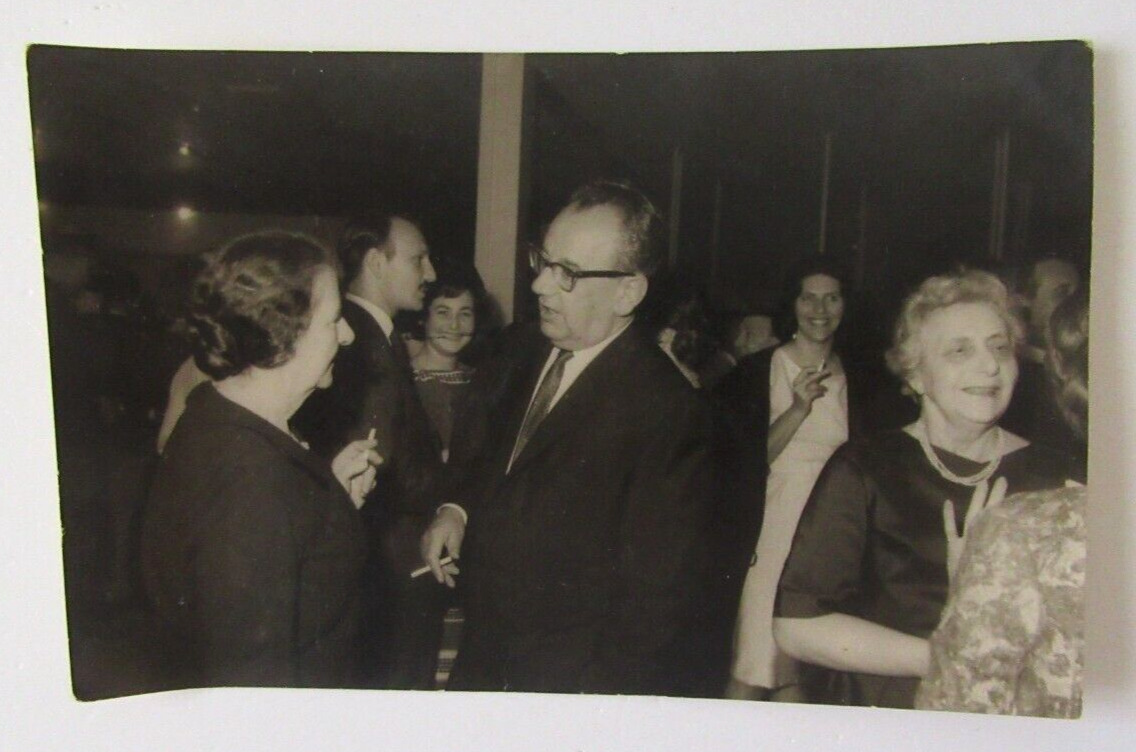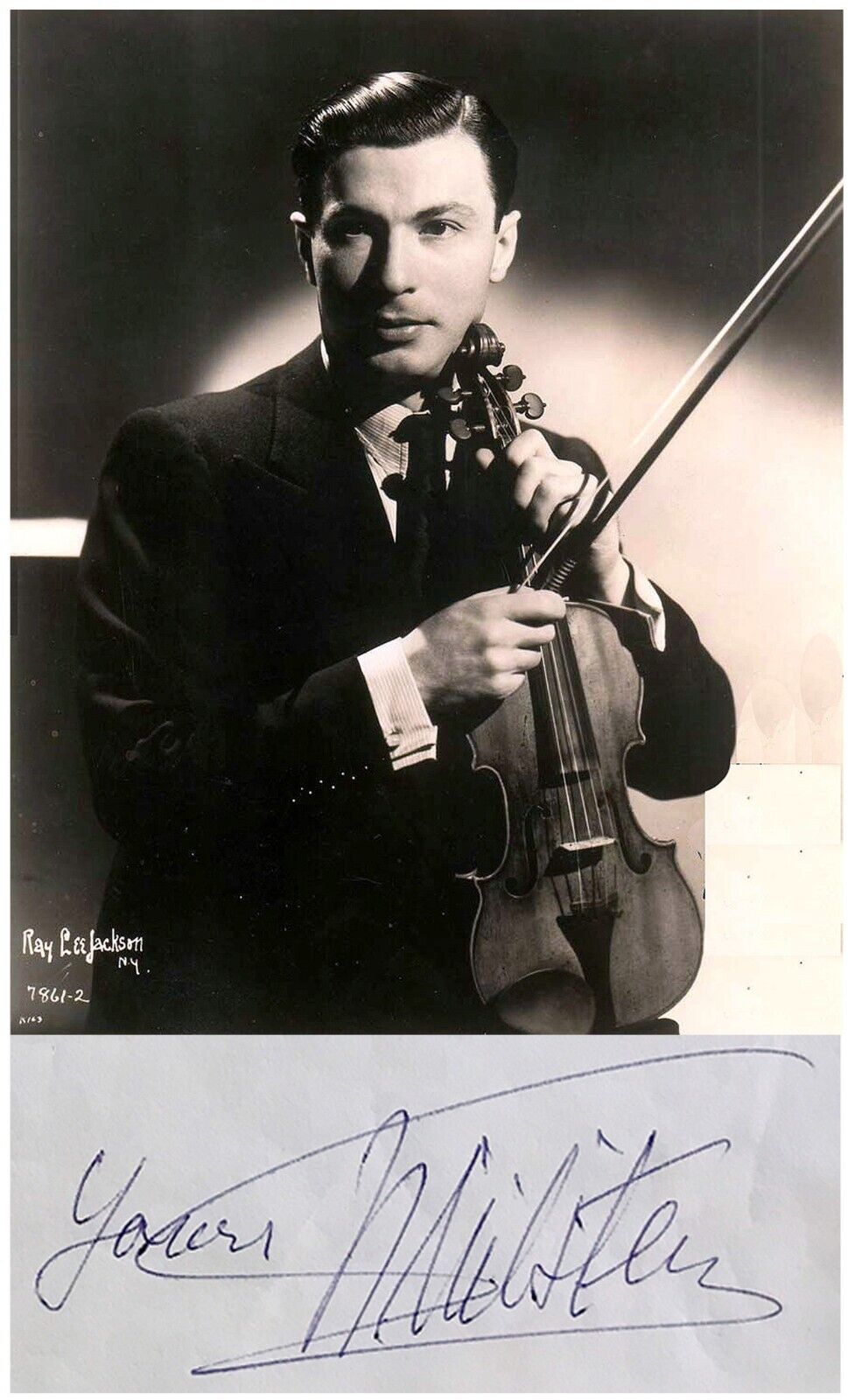-40%
1962 Israel MOVIE POSTER Film ONE TWO THREE Wilder CAGNEY Buchholz HEBREW Jewish
$ 44.17
- Description
- Size Guide
Description
DESCRIPTION:
Here for sale is an over 55 years old EXCEPTIONALY RARE and ORIGINAL Jewish Judaica POSTER
for t
he ISRAEL 19
62
( dated ) PREMIERE of
BILLY WILDER's
film , AWARDS winner and nominee of Academy Awards, Golden Globes awards and many others " ONE. TWO, THREE
" . Starring JAMES CAGNEY and HORST BUCHHOLZ
in t
he cinema-movie hall " CINEMA SHARON"
in the small rural town of NATHANYA in ISRAEL
. "CINEMA SHARON" ,
A local Israeli version of "Cinema Paradiso" was printing manualy its own posters , And thus you can be certain that this surviving copy is ONE OF ITS KIND. Text in HEBREW and ENGLISH . Please note : This is NOT a re-release poster but PREMIERE - FIRST RELEASE projection of the film , One year after its release in 19
60
in USA and worldwide .
The ISRAELI distributors of the film have provided the poster an amusing and quite archaic Hebrew text and also a new Hebrew name " One, Two and We are There "
.
A GENUINE RARITY.
Size Around 32" x 27". ( Not accurate ) Printed in red and blue on white paper .
The condition is very good . Used. Folded twice . Very slightlt stained. Made as issued by the movie hall of 2 parts connected together .
( Pls look at scan for accurate AS IS images ) Poster will be sent rolled in a special protective rigid sealed tube.
AUTHENTICITY
:
This poster is guaranteed ORIGINAL from 19
62
( dated ) , NOT a reprint or a recently made immitation. , It holds a life long GUARANTEE for its AUTHENTICITY and ORIGINALITY.
PAYMENTS
:
Payment method accepted : Paypal & All credit cards.
SHIPPMENT
:
SHIPP worldwide via registered airmail
is $ 25
. Poster will be sent rolled in a special protective rigid sealed tube. Handling around 5 days after payment.
One, Two, Three is a 1961 American comedy film directed by Billy Wilder and written by Wilder and I. A. L. Diamond. It is based on the 1929 Hungarian one-act play Egy, kettő, három by Ferenc Molnár, with a "plot borrowed partly from" Ninotchka, a 1939 film co-written by Wilder.[3][4] The comedy features James Cagney, Horst Buchholz, Lilo Pulver, Pamela Tiffin, Arlene Francis, Leon Askin, Howard St. John, and others.[5] It would be Cagney's last film appearance until Ragtime in 1981, 20 years later.[6][7] The film is primarily set in West Berlin during the Cold War, but before the construction of the Berlin Wall, and politics is predominant in the premise. The film is known for its quick pace.[8] Contents [hide] · 1Plot · 2Cast · 3Production · 4Soundtrack · 5Release · 6Reception o 6.1Critical response o 6.2Box office o 6.3Censorship o 6.4Awards o 6.5Homages and references · 7Re-releases · 8See also · 9References · 10External links Plot[edit] C.R. "Mac" MacNamara is a high-ranking executive in the Coca-Cola Company, assigned to West Berlin after a business fiasco a few years earlier in the Middle East (about which he is still bitter). While based in West Germany for now, Mac is angling to become head of Western European Coca-Cola Operations, based in London. After working on an arrangement to introduce Coke into the Soviet Union, Mac receives a call from his boss, W.P. Hazeltine, in Atlanta. Scarlett Hazeltine, the boss's hot-blooded but slightly dim 17-year-old socialite daughter, is coming to West Berlin. Mac is assigned the unenviable task of taking care of this young whirlwind. An expected two-week stay develops into two months, and Mac discovers just why Scarlett is enamored of West Berlin: she surprises him by announcing that she's married to Otto Piffl, a young East German Communist with ardent anti-capitalistic views. When the southern belle is confronted about her foolishness in the matter of helping him blow up anti-American "Yankee Go Home" balloons (how the couple met) she simply replies with, "Why, that ain't anti-american, it's anti-yankee... And where I come from, everybody's against the yankees..." Mac tries to come to terms with the fact that he let his boss's daughter marry a communist and learns the horrible truth: The couple are bound for Moscow to make a new life for themselves ("They've assigned us a magnificent apartment, just a short walk from the bathroom!"). Since Hazeltine and his wife are coming to Berlin to collect their daughter the very next day, this is obviously a disaster of monumental proportions, and Mac deals with it as any good capitalist would — by framing the young Communist firebrand and having him picked up by the East German police, using all his wiles, as well as his sexy secretary Fraulein Ingeborg, to get his way. After Otto is forced to listen endlessly to the song "Itsy Bitsy Teenie Weenie Yellow Polka Dot Bikini" during interrogation, he cracks and signs a confession that he's an American spy. Under pressure from his stern and disapproving wife Phyllis (who wants to take her family back to live in the U.S.), and with the revelation that Scarlett is pregnant, Mac sets out to bring Otto back with the help of his new Soviet business associates. With the boss on the way, he finds that his only chance is to turn Otto into a son-in-law in good standing — which means, among other things, making him a capitalist with an aristocratic pedigree (albeit contrived by adoption). In the end, the Hazeltines approve of their new son-in-law, upon which Mac learns from Hazeltine that Otto will be named the new head of Western European Operations, with Mac getting a promotion to VP of Procurement back in Atlanta. Mac reconciles with his family at the airport and to celebrate his promotion, offers to buy them Cokes. Ironically, after handing out the bottles to his family, he discovers that the Coke machine actually has been stocked with Pepsi-Cola.[9] Cast[edit] · James Cagney as C.R. "Mac" MacNamara · Horst Buchholz as Otto Ludwig Piffl · Pamela Tiffin as Scarlett Hazeltine · Arlene Francis as Phyllis MacNamara · Liselotte Pulver as Fräulein Ingeborg (Mac's secretary) · Hanns Lothar as Schlemmer (Mac's assistant and henchman) · Howard St. John as Wendell P. Hazeltine · Leon Askin as Peripetchikoff · Ralf Wolter as Borodenko · Peter Capell as Mishkin · Karl Lieffen as Fritz (Mac's chauffeur) · Hubert von Meyerinck as Count Waldemar von Droste-Schattenburg · Sig Ruman as the English voice of Count von Droste-Schattenburg · Loïs Bolton as Melanie Hazeltine · Til Kiwe as Reporter · Henning Schlüter as Dr. Bauer · Karl Ludwig Lindt as Zeidlitz · Friedrich Hollaender as conductor of the hotel orchestra Production[edit] “ We knew that we were going to have a comedy, we [were] not going to be waiting for the laughs. But we had to go with Cagney, because Cagney was the whole picture. He really had the rhythm, and that was very good. It was not funny. But just the speed was funny...The general idea was, let's make the fastest picture in the world...And yeah, we did not wait, for once, for the big laughs. ” — From Conversations with Wilder (1999, ISBN 0-375-40660-3) by Cameron Crowe[10] Cagney decided to take the role primarily because it was to be shot in Germany: while growing up in Manhattan's Yorkville neighborhood, he had had fond memories of the area, which was "teeming with German immigrants."[10] Horst Buchholz was a young European actor who had recently finished The Magnificent Seven with Yul Brynner and Steve McQueen; during the production, he became the only actor that Cagney ever openly disliked:[10] I got riled at S.Z. Sakall [...] in Yankee Doodle Dandy for trying to steal a scene, but he was an incorrigible old ham who was quietly and respectfully put in his place by Michael Curtiz. No harm in the old boy. But this Horst Buchholz character I truly loathed. Had he kept on with his little scene-stealing didoes, I would have been forced to knock him on his ass, which I would have very much enjoyed doing. Wilder was filming in Berlin the morning the Berlin Wall went up, forcing the crew to move to Munich.[4] During principal photography, Wilder received a call from Joan Crawford, recently appointed to the board of directors of Pepsi-Cola following her husband Alfred Steele's death. In response to Crawford's protests over the use of the Coca-Cola brand in the film, Wilder scattered some references to Pepsi, including the final scene.[11] Some scenes were shot at Bavaria Film Studios.[10] The theatrical release poster for the film, with a woman holding three balloons, was designed by Saul Bass. The Bass designed poster that Wilder originally intended for the film's release featured a United States style flag sticking out of a Coca-Cola-style bottle. The poster had to be replaced, however, when Coca-Cola threatened legal action against United Artists for copyright infringement.[12] Soundtrack[edit] Aram Khachaturian's lively "Sabre Dance" marks the moments when Mac moves into energetic action.[citation needed] Release[edit] When the movie opened, it came with a spoken preface by Cagney, added by Wilder: "On Sunday, August 13th, 1961, the eyes of America were on the nation's capital, where Roger Maris was hitting home runs #44 and 45 against the Senators. On that same day, without any warning, the East German Communists sealed off the border between East and West Berlin. I only mention this to show the kind of people we're dealing with—REAL SHIFTY."[4] Reception[edit] Critical response[edit] Critic Bosley Crowther applauded the work of Cagney and wrote, "With all due respect for all the others, all of whom are very good—Pamela Tiffin, a new young beauty, as Scarlett; Horst Buchholz as the East Berlin boy, Lilo Pulver as a German secretary, Leon Askin as a Communist stooge and several more—the burden is carried by Mr. Cagney, who is a good 50 per cent of the show. He has seldom worked so hard in any picture or had such a browbeating ball. His fellow is a free-wheeling rascal. His wife (Arlene Francis) hates his guts. He knows all the ways of beating the rackets and has no compunctions about their use. He is brutishly bold and brassy, wildly ingenious and glib. Mr. Cagney makes you mistrust him—but he sure makes you laugh with him. And that's about the nature of the picture. It is one with which you can laugh—with its own impudence toward foreign crises—while laughing at its rowdy spinning jokes."[1] Time magazine called it a "yell-mell, hard-sell, Sennett-with-a-sound-track satire of iron curtains and color lines, of people's demockeracy, Coca-Colonization, peaceful noexistence [sic], and the Deep Southern concept that all facilities are created separate but equal."[3] Time notes Wilder "purposely neglects the high precision of hilarity that made Some Like It Hot a screwball classic and The Apartment a peerless comedy of officemanship. But in the rapid, brutal, whambam style of a man swatting flies with a pile driver, he has produced a sometimes beWildered [sic], often wonderfully funny exercise in nonstop nuttiness." The film won kudos from the staff at Variety. They wrote, "Billy Wilder's One, Two, Three is a fast-paced, high-pitched, hard-hitting, lighthearted farce crammed with topical gags and spiced with satirical overtones. Story is so furiously quick-witted that some of its wit gets snarled and smothered in overlap. But total experience packs a considerable wallop."[13] According to J. Hoberman, screenwriter Abby Mann (who wrote Judgment at Nuremberg) "deemed Wilder's [film] so tasteless, he felt obliged to apologize for it at the Moscow Film Festival."[4] Box office[edit] One, Two, Three did not do well at either the U.S. or German box office. The lighthearted East-West Berlin story felt much more sinister at the release, since the Berlin Wall had been built after principal photography began.[14] The film recorded a loss of .6 million.[2] However, it was re-released in 1985 in France and Germany and became a box office success, especially in West Berlin.[14] Censorship[edit] One, Two, Three was banned in Finland from 1962 to 1986 on "political" grounds — it was feared that the film would harm relations between Finland and the Soviet Union.[15] United Pictures Finland tried to get the film released theatrically in 1962, 1966 and 1969 but it was only in 1986 that the Finnish Board of Film Classificationallowed the film to be distributed. Awards[edit] Nominations · Academy Awards: Oscar, Best Cinematography, Black-and-White, Daniel L. Fapp; 1962. · Golden Globes: Golden Globe, Best Motion Picture – Comedy; Best Supporting Actress, Pamela Tiffin; 1962. · Laurel Awards: Golden Laurel, Top Comedy, 4th place; Top Male Comedy Performance, James Cagney, 4th place; 1962. · Writers Guild of America Awards: Best Written American Comedy (Screen), Billy Wilder and I.A.L. Diamond; 1962. Homages and references[edit] · The film makes several references to Cagney's earlier films, including a Cagney impression from Red Buttons, and the grapefruit-to-the-face incident from The Public Enemy. Additionally, the cuckoo clock in McNamara's office plays "Yankee Doodle Dandy". Cagney also refers to his contemporary Edward G. Robinson by using Robinson's line "Mother of Mercy, is this the end of Rico?" from Little Caesar, which was a competitor of The Public Enemy. · The Cold War is referenced, with one joke spoken by an apparatchik seeming to foreshadow the Cuban Missile Crisis: "We have trade agreement with Cuba: they send us cigars, we send them rockets."[4] · Cagney noted that he quit Hollywood after this film due to fatigue from an inordinate number of lines in a lengthy movie helmed by a demanding Wilder and to a feeling of jealousy when he heard from a friend about to set off on a leisurely yachting trip.[7] · In the 2015 Steven Spielberg directed film about an incident in the cold war, Bridge of Spies, there is a scene with a Berlin movie-house showing the film Eins, Zwei, Drei in the background. Movies You Might Have Missed: Billy Wilder’s One, Two, Three This fast-paced farce starring James Cagney was shot in Berlin but had to relocate to Munich when the Berlin Wall went up during filming Darren Richman Wednesday 9 November 2016 16:00 GMT0 comments 0 Click to follow The Independent Culture ‘One, Two, Three’ stars James Cagney as CR ‘Mac’ MacNamara, a Coca-Cola executive in West Berlin during the Cold War who is assigned with the task of looking after his employer's socialite daughter Billy Wilder is a towering figure in the history of motion pictures. Perhaps the most versatile director of Hollywood’s golden age, with Double Indemnity and Sunset Boulevard he all but created the blueprint for film noir. Some Like It Hot and The Apartment, staggeringly released in successive years, are two of the most beloved comedies ever made. One, Two, Three, the auteur's next film, while not quite as acclaimed, still has plenty to recommend it. One, Two, Three (1961) stars James Cagney as CR “Mac” MacNamara, a Coca-Cola executive in West Berlin during the Cold War who is tasked with looking after his employer's socialite daughter. The girl (played by Pamela Tiffin) slips across the border, weds a vehemently anti-capitalist East German and reveals she's pregnant with his baby. This is far from ideal, especially with her father's impending arrival in Berlin. “The general idea was, let's make the fastest picture in the world,” Wilder said, and there is something of the Marx Brothers in this approach to farce. The filmmaker is clearly unfussed about whether the audience misses a joke or two and the cumulative effect of the relentless gags is so overwhelming that we have no choice but to give in. Cagney took the role largely because the film was to be shot on location in Berlin and he had fond memories of growing up in a Manhattan neighbourhood “teeming with German immigrants”. His performance, as the ambitious employee with farcical events conspiring against him, is pitch-perfect despite certain issues the actor had with his colleagues. Horst Buchholz riled Cagney to such an extent that he later said: “Had he kept on with his little scene-stealing didoes [tricks], I would have been forced to knock him on his ass, which I would have very much enjoyed doing.” This was far from the only issue that plagued the production. The Berlin Wall actually went up during filming and the crew were forced to relocate to Munich. After the huge success of Wilder's previous two films, One, Two, Three recorded a loss of .6m, in part because the erection of the wall gave the story more sinister undertones than were originally intended. Still, with the benefit of hindsight, it’s a fast-paced farce crammed full of hilarious set-pieces and an underrated gem by one of the medium’s true masters. One, Two, Three FILM BY WILDER [1961] WRITTEN BY: Lee Pfeiffer See Article History One, Two, Three, American screwball comedy film, released in 1961, that was directed by Billy Wilder and was based on a one-act play by Ferenc Molnár. The film is set during the Cold Warand is noted for its lightning-fast pace. James Cagney portrayed the brutish, wildly fast-talking head of Coca Cola’s West Berlin operation who finds himself coping simultaneously with a failing marriage, Soviet industrial spies, and the unenviable task of safeguarding his boss’s teenage daughter, Scarlett (played by Pamela Tiffin). His problems multiply when Scarlett reveals her impulsive marriage to a committed communist (played by Horst Buchholz), giving Cagney’s character just one day to resolve the issue before her father comes to collect her. Director Wilder encountered many problems while filming in Germany. The Soviets began construction of the Berlin Wall during the shoot, and Cagney detested working with up-and-coming German star Buchholz, whom he regarded as a self-centred scene-stealer. Uninformed viewers may not fully appreciate One, Two, Three’s political jokes and allusions to old gangster movies (including The Public Enemy [1931], Cagney’s breakout film), but One, Two, Three’s status as an inventive and clever comedy outlasted the era that informed its script. After One, Two, Three, Cagney retired, but he returned to the screen in the 1981 film drama Ragtime. Billy Wilder’s frantic Cold War comedy deserves another look Gwen Ihnat 4/01/16 12:00pm 55 Every day, Watch This offers staff recommendations inspired by the week’s new releases or premieres. This week: Celebrate Cold War Week at The A.V. Club with some stellar movies about that decades-spanning conflict. One, Two, Three (1961) Billy Wilder was shooting his breathless comedy One, Two, Three in Berlin when the Wall went up on August 13, 1961. His crew had to quickly scurry over to Munich to continue filming. Which points to the perfect timing of the political-themed comedy, that still for whatever reason resides on the definitive B-list of the director’s work. It belongs on the A-list. One, Two, Three, penned by Wilder and his frequent collaborator I.A.L. Diamond, fires countless Cold War wisecracks while serving as a perfect showcase for James Cagney, in his second-to-last movie role. Cagney was obviously best-known as a cinematic gangster, with another past as a song-and-dance man, but who knew he could be this funny? Here he’s C.R. “Mac” MacNamara, an American Coca-Cola executive in West Berlin, attempting to market his product past the Iron Curtain. Saddled with watching the boss’s daughter (Pamela Tiffin), he is horrified when she hooks up with East German Communist Otto (Horst Buchholz), with the boss due to arrive any minute. The 62-year-old Cagney has about 80 percent of the dialogue, and the entire movie rests on his own frenetic energy and unerring ability to make people follow him no matter what. Getting the Communist arrested, then negotiating to fish him out of prison, then calling on an absolute army of helpers to transform the young man into a suitable son-in-law before the in-laws arrive: Let’s just say that Aram Khachaturian’s frantic “Sabre Dance” (you’ll know it when you hear it) is the perfect soundtrack. Past the manic frenzy of the screwball comedy are many sly nods to the frosty Cold War relations between the East and the West. Mac bribes his way into East Berlin with a six-pack of Coke. Mac’s office staff, used to following a dictator, still stands in unison when he enters a room, and his assistant and chauffeur both click their heels, S.S.-style. When Otto the proletariat refuses to wear boxer shorts, because they’re “useless,” Mac’s wife slyly nods, “No wonder they’re winning the Cold War.” A few Soviet comrades offer Mac Cuban cigars, noting, “We give them missiles, they give us cigars”; the following year saw the Cuban Missile Crisis. Although crafting a comedy about such world-altering topics was bound to be difficult, a master like Wilder could pull it off. His unspoken moral is that the American way wins out: Cagney personifies the U.S. can-do attitude, and easily bests every Communist he faces. (Look for many nods to Cagney’s extensive film history: the Public Enemy grapefruit-in-the-face; a cuckoo clock sings his most famous movie song; Red Buttons as an M.P. does a Cagney impression.) The last 30 minutes, especially, with Cagney snapping his fingers to pull off his master plan as various minions scurry around him, is a head-shaking wonder of film comedy. The feat apparently exhausted Cagney: He didn’t make another movie for 20 years, returning to the screen for the final time in 1981 for Ragtime. One, Two, Three Billy Wilder's One, Two, Three is a fast-paced, high-pitched, hard-hitting, lighthearted farce crammed with topical gags and spiced with satirical overtones. Story is so furiously quick-witted that some of its wit gets snarled and smothered in overlap. But total experience packs a considerable wallop. By Variety Staff @Variety Variety Staff Follow Us on Twitter @Variety FOLLOW Variety's Most Recent Stories ASCAP Distributes Billion to Members for the First Time Carrie Underwood Announces New Album, ‘Cry Pretty’ James Comey Likens Trump Presidency to ‘Forest Fire’ on ‘Late Show With Stephen Colbert’ VIEW ALL Facebook Twitter Reddit Email Show more sharing options LinkedIn WhatsApp Print Pin It Tumblr With: James Cagney Horst Buchholz Pamela Tiffin Arlene Francis Lilo Pulver Lilo Pulver Howard St John Billy Wilder’s One, Two, Three is a fast-paced, high-pitched, hard-hitting, lighthearted farce crammed with topical gags and spiced with satirical overtones. Story is so furiously quick-witted that some of its wit gets snarled and smothered in overlap. But total experience packs a considerable wallop. James Cagney is the chief exec of Coca-Cola’s West Berlin plant whose ambitious promotion plans are jeopardized when he becomes temporary guardian of his stateside superior’s wild and vacuous daughter. The girl (Pamela Tiffin) slips across the border, weds violently anti-Yankee Horst Buchholz, and before long there’s a bouncing baby Bolshevik on the way. When the home office head man decides to visit his daughter, Cagney masterminds an elaborate masquerade that backfires. The screenplay, based on a one-act play by Ferenc Molnar, is outstanding. It pulls no punches and lands a few political and ideological haymakers on both sides of the Brandenburg Gate. Cagney proves himself an expert farceur with a glib, full-throttled characterization. Although some of Buchholz delivery has more bark than bite, he reveals a considerable flair for comedy. Pretty Tiffin scores with a convincing display of mental density. Another significant factor in the comedy is Andre Previn’s score, which incorporates semi-classical and period pop themes (like Saber Dance and ‘Yes, We Have No Bananas’) to great advantage throughout the film. 1961: Nomination: Best B&W Cinematography One, Two, Three PRODUCTION: Mirisch. Director Billy Wilder; Producer Billy Wilder; Screenplay Billy Wilder, I.A.L. Diamond; Camera Daniel L. Fapp; Editor Daniel Mandell; Music Andre Previn (arr.); Art Director Alexandre Trauner CREW: (B&W) Widescreen. Available on VHS, DVD. Extract of a review from 1961. Running time: 115 MIN. WITH: James Cagney Horst Buchholz Pamela Tiffin Arlene Francis Lilo Pulver Lilo Pulver Howard St John ebay 4339
